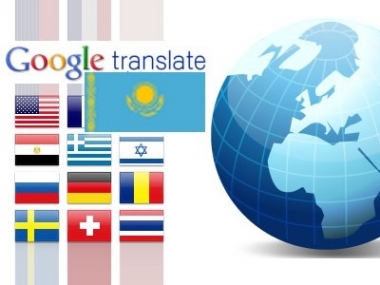ASTANA – The Kazakh language is now among the offerings of the Google Translate online global translating system, founder and director of theWikiBilim Public Foundation Rauan Kenzhekhanuly announced on Dec. 12.
 Kazakh joins the 90 other languages available through the translation system, which is accessible on computers and mobile devices. WikiBilim is a nonprofit organisation operating in Kazakhstan that develops and promotes online educational content in the Kazakh language.
Kazakh joins the 90 other languages available through the translation system, which is accessible on computers and mobile devices. WikiBilim is a nonprofit organisation operating in Kazakhstan that develops and promotes online educational content in the Kazakh language.
“One and a half year ago, we started to think how to include the Kazakh language in Google Translate. We addressed this question to the Google Company and were told that it would be necessary to provide the system with a large number of mirror translations from Kazakh into English and back. This would give the translating system an opportunity to seize the algorithm of Kazakh and after a while be able to build its initial translation options,” Kenzhekhanuly said.
The WikiBilim team started off translating Wikipedia into Kazakh, according to Kenzhekhanuly.
“The Kazakh Wikipedia only had 7,000 articles and four people working on the translations before we actively started to translate content into Kazakh. Our task was to assemble a team or a community that would undertake the task to translate and edit articles into Kazakh. Today, we have some 210,000 articles, and 350 people are constantly working on the project. By translating Wikipedia, we created a database and algorithms that allowed us to transcribe the alphabets properly,” he said as he explained the process during a Dec. 15 briefing at the Central Communications Service.
In the middle of October, Kenzhekhanuly announced a test mode of translating Kazakh into English and back. However, the system could not manage translations of long texts and was more convenient for translating words and phrases.
Currently, translations are available to and from English; later, Kenzhekhanuly promised, the system will slowly adopt Russian-Kazakh translations as well. He urged all Kazakh and English speakers to help their team improve the translation by contributing corrections to the system.
To correct mistakes in translation, developers suggest clicking the pencil icon and making needed corrections, then saving those changes by clicking “Improve translation.”
“We are very grateful to the people of Kazakhstan for their contribution to the Google Translate Community and invite everyone to continue the work on improvement of online translation in the future,” Google’s press service reported.
The Google translator is free and available to all users. According to recent data, more than 200 million users are using it daily.
Because Turkish and Azerbaijani, Turkic languages like Kazakh, were also among the 90 languages offered by Google Translate, the nature of the Kazakh language was already familiar to the system.
“Google Translate is a world where the most active languages exist. Being part of such a big process gives us a lot in terms of technology and the development of the language itself. The system is improving all the time and provides additional possibilities. Today, it is possible to simply tell a story and get a translation,” said Kenzhekhanuly.
Volunteer and project coordinator of the Google Translate Community service Marat Shaken said that the project currently involves about 300 active volunteers. All of them make changes on a daily basis. Many of them can make up to 300 amendments to the service per day. The translations are not yet perfect, so their work will not stop, he said.
“I will continue to teach courses and coordinate the work of project volunteers. At the beginning, volunteers needed to know two languages: Kazakh and English. However, soon, people with knowledge of Kazakh and Russian will be able to become volunteers. In my view, this will make our work easier and the quality of translation better,” Shaken said.
Shaken said that the team had not faced any particular challenges in their work, but that it was difficult to ask people to do the translation work for free. They did not fully understand sometimes why it was necessary and how they would personally benefit from it. “Nevertheless, volunteers joined us and made their contribution. I would like to thank all the people who have been around during the realisation of this idea,” Shaken concluded.


